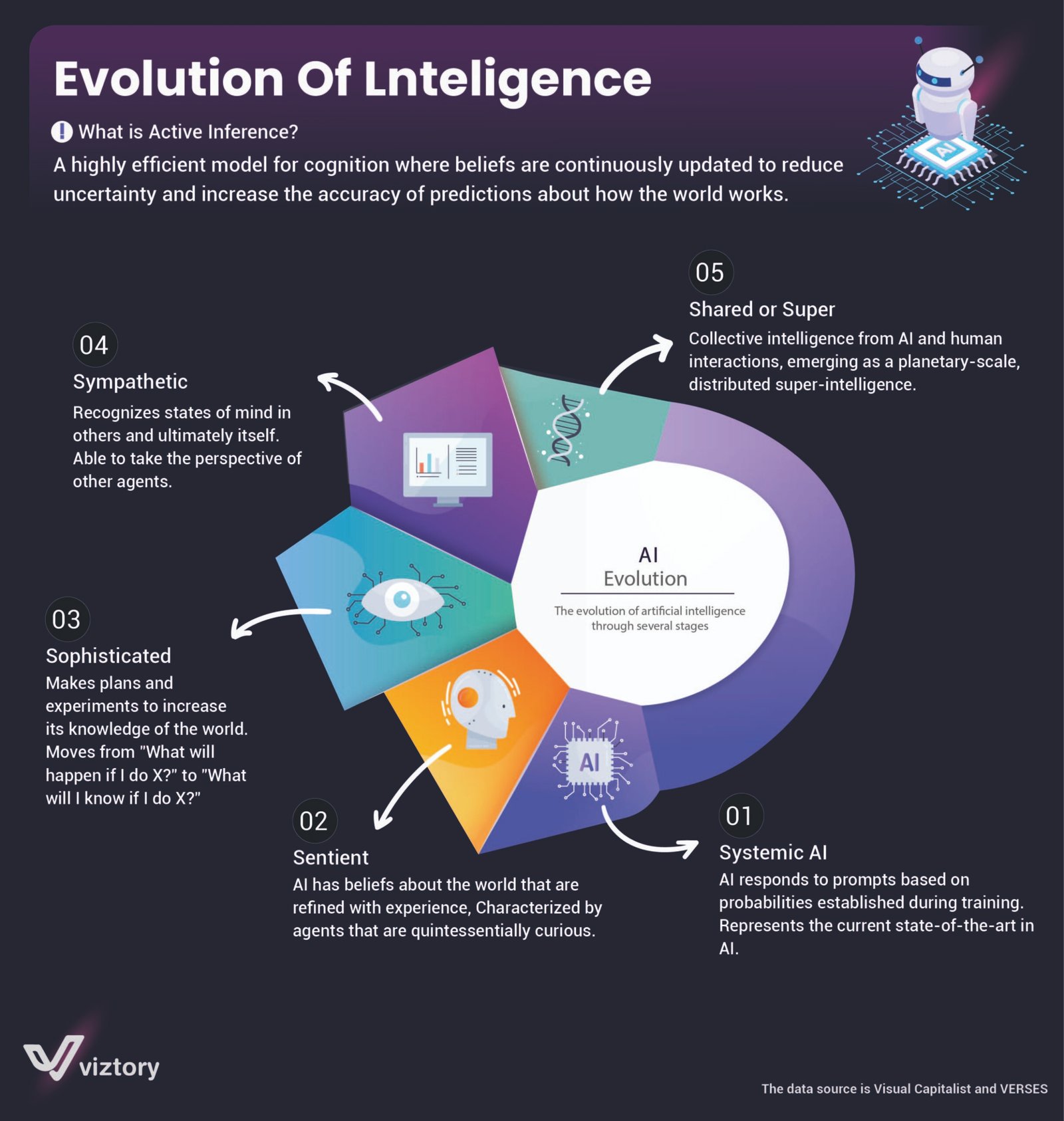Evolution of Intelligence: A Pathway to Advanced Marketing Strategies
-
Aug, Wed, 2024
Evolution of Intelligence: A Pathway to Advanced Marketing Strategies
The journey of artificial intelligence (AI) from basic systems to complex, super-intelligent entities is not just a fascinating narrative—it’s a roadmap that businesses can leverage to refine their marketing strategies. The “Evolution of Intelligence” infographic visually encapsulates AI’s development across five key stages, each offering unique insights into how marketing can be transformed by adopting AI at various levels of sophistication.
1. Systemic AI: The Current Standard
Systemic AI, the most common form in use today, operates based on probabilities established during training. This AI responds to prompts in a predetermined manner, much like the automation tools currently popular in digital marketing. Systemic AI enables businesses to efficiently handle repetitive tasks, such as customer segmentation, content scheduling, and basic customer service interactions.
Marketing Insight: Leveraging Systemic AI allows for the automation of routine processes, freeing up human resources for more creative and strategic endeavors. For instance, chatbots powered by Systemic AI can handle basic customer queries, ensuring consistent and timely communication.
2. Sentient AI: The Curious Marketer
Sentient AI goes a step further by developing beliefs about the world that are refined with experience. Characterized by curiosity, this level of AI is essential for exploring new market trends and consumer behaviors. Sentient AI can analyze vast amounts of data, recognizing patterns and anomalies that might otherwise go unnoticed.
Marketing Insight: By integrating Sentient AI, marketers can uncover deep insights into consumer preferences and emerging trends, enabling more personalized and dynamic marketing campaigns. This AI can help predict what types of content or products will resonate with different audience segments.
3. Sophisticated AI: The Strategic Planner
Sophisticated AI makes plans and conducts experiments to deepen its understanding of the world. It moves beyond simple responses to questions like “What will happen if I do X?” to more complex inquiries such as “What will I know if I do X?” This stage is crucial for adaptive marketing strategies that require a deeper understanding of cause-and-effect relationships.
Marketing Insight: Sophisticated AI can be utilized to optimize marketing campaigns in real-time. For example, by experimenting with different ad placements, content variations, or timing, this AI can fine-tune strategies for maximum impact, ensuring that marketing efforts are not only effective but also continuously improving.
4. Sympathetic AI: The Empathetic Marketer
At this level, AI begins to recognize states of mind in others and, crucially, itself. It is capable of taking the perspective of other agents, which is particularly valuable in understanding and predicting consumer emotions and responses.
Marketing Insight: Sympathetic AI can revolutionize customer experience by enabling hyper-personalization. By understanding the emotional state of consumers, brands can tailor their messaging and offers to align with the customer’s current mindset, fostering deeper connections and loyalty.
5. Shared or Super AI: The Collective Intelligence
The final stage, Shared or Super AI, represents a collective intelligence formed from AI and human interactions, emerging as a distributed super-intelligence. This AI could potentially operate on a planetary scale, integrating vast amounts of data from diverse sources to create an unparalleled understanding of global trends and behaviors.
Marketing Insight: In the realm of marketing, Shared AI could lead to unprecedented levels of collaboration and insight-sharing across industries. It could enable marketers to anticipate and respond to global trends in real-time, offering personalized solutions on a massive scale.
Integrating AI Evolution into Marketing
Understanding the evolution of AI is crucial for marketers aiming to stay ahead in a rapidly changing landscape. By aligning marketing strategies with the capabilities of AI at each stage, businesses can enhance efficiency, personalization, and strategic decision-making.
The future of marketing lies in the intelligent application of AI, where each stage of AI evolution contributes to a more refined and effective approach to reaching and engaging with consumers. As AI continues to evolve, so too will the possibilities for creating deeper, more meaningful connections with audiences around the world.

